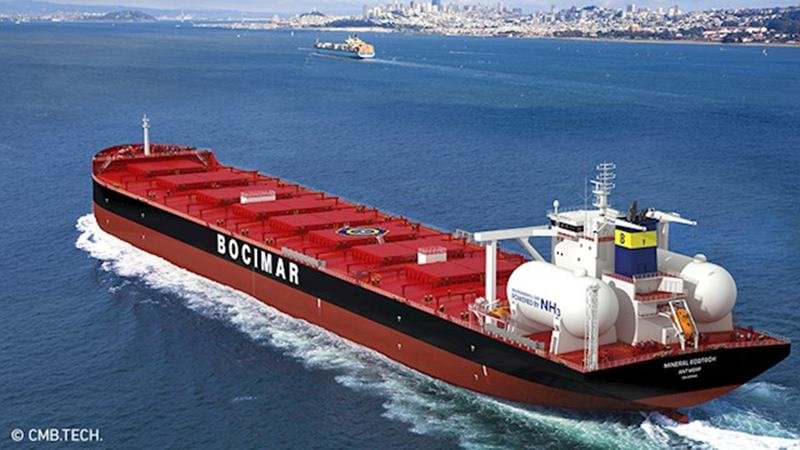Swiss marine power company WinGD has concluded a four-party agreement underwriting Belgian bulk carrier operator CMB.TECH’s order of X72DF‑A ammonia-fuelled engines. CSSC Qingdao Beihai Shipbuilding (QBS) and engine builder CSSC Engine Co (CSE) were the other signatories in the joint undertaking to power a series of 210,000 DWT bulk carriers to be delivered from Qingdao through 2025 and 2026.
Following confirmation of the engine order, the agreement advances the project between WinGD and CMB.TECH announced in January to develop the 72-bore ammonia-engine. The close cooperation and shared responsibility reflected in the agreement highlights the groundbreaking nature of the order: the vessels will be the first ammonia-fuelled bulk carriers to be built; the WinGD engine designs will be the first of their size for ammonia; and they will be the first ammonia engines built in China.
CMB.TECH CEO, Alexander Saverys said: “CMB.TECH sees green ammonia as one of the big solutions to decarbonise long-distance shipping and this order brings to fruition our active commitment to develop this pathway. The gathering of expertise under this agreement will ensure that our first ammonia-fuelled vessels are built and powered in a safe and sustainable way, as well as helping to decarbonise our business and our customers’ logistics.”
WinGD CEO, Dominik Schneiter said: “Having progressed the engine design and vessel integration concept rapidly with CMB.TECH over the past nine months, enlisting the mutual cooperation of the shipyard and engine builder is a critical next step. As well as safeguarding the successful entry into operation of these innovative engines, this collaboration will also accelerate the spread of ammonia capabilities across key stakeholder groups, placing the whole industry on surer footing as it explores a vital decarbonisation pathway.”
QBS Executive VP, Gu Kechao said: “CMB.TECH’s decision to have its first ammonia-fuelled vessels built by CSSC Qingdao Beihai Shipbuilding underscores the company’s faith in the quality and value of our work. It also highlights growing acknowledgement of the wider Chinese capability in complex shipbuilding projects. Building among the first ammonia-fuelled vessels in the world will place QBS in a strong position to support further customers with their maritime decarbonisation projects.”
CSE Chief Engineer, Zhang Guangwei said: “Bringing a new engine design into commercial operation is aways the result of strong joint effort between engine and vessel designer, engine builder, shipyard and owner. CSE is honoured to be the first engine builder in China to deliver ammonia-fuelled engines to the maritime market, and to take an early role in what will become a significant market as ammonia fuel is used more widely in shipping.”
WinGD’s X‑DF‑A engines operate using high-pressure fuel injection with a small portion of pilot fuel and will have performance and fuel efficiency comparable to the company’s diesel-fuelled X‑Engines. No aftertreatment is required for N2O emissions, while selective catalytic reduction is used to ensure Tier III NOx compliance in both ammonia and diesel modes.
Safe operation and maintenance of ammonia-fuelled engines and vessels has been a key undertaking of the project to date. The hazard identification (HAZID) studies, followed by an Approval in Principle from Lloyd’s Register of the X‑DF‑A engine concept were pivotal to WinGD and CMB.TECH verifying that ammonia-fuelled engines built, commissioned and operated to the approved design have equivalent safety to conventionally fuelled engines.
Source WinGD

